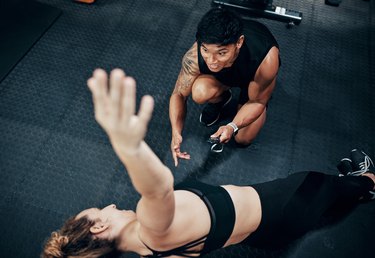
Flanks, which are also commonly referred to as love handles or obliques, are part of your core. This region of your body is a common area for fat to accumulate as you age. Fortunately, any exercise for waist fat will target your core, including your flanks.
Video of the Day
Video of the Day
Love Handles and Your Health
As you age, you're likely to lose muscle mass and put on weight. Harvard Health Publishing says that these extra pounds are particularly likely to deposit themselves in your midsection.
This weight gain is likely to be accompanied by a decrease in muscle quantity and quality. According to a November 2015 study in the Ultrasound in Medicine and Biology Journal, your flanks (otherwise known as obliques) are one of the first muscles to be affected.
Extra weight around the stomach can lead to the formation of love handles and other types of abdominal fat. This type of abdominal fat, which has the potential to be stored as visceral fat, can be particularly bad for your health. Visceral fat has been associated with the development of conditions like heart disease, asthma and certain types of cancer.
Fortunately, it's possible to perform a variety of different exercises in order to shed the visceral fat stored in your body. However, you should be aware that spot reduction to reduce your love handles isn't possible.
Any exercise for waist fat will allow you to lose weight in general. As long as you're operating under a calorie deficit you'll burn more calories than you ingest. This will help you lose weight all over your body.
That being said, there are many great flank exercises you can integrate into your workouts. A good flank workout will target your entire core, which according to a July 2016 study in Sports Medicine, can help prevent injuries and lower back pain and improve sports performance.
Read more: These 12 Moves Will Get You Washboard Abs
Flank Exercises for Your Workout
If you're trying to target flank fat, these exercises can help you lose weight while strengthening your core and back.
Warning
If you aren't used to regular exercise, it may be best to start out with fewer reps initially, so that you don't injure yourself and end up with a painful pulled muscle.
However, it's also possible to experience flank pain that's unrelated to exercise. You should know that the U.S. National Library of Medicine says that flank pain can be a sign of a kidney, gallbladder, liver, gut or back problem.
Move 1: Side Crunches
Side crunches are similar to regular crunches, but with an added twist. This exercise is ideal for any flank workout.
- Lie down, with your knees raised. Hook your feet so that they won't move while doing this exercise.
- Cross your arms over your chest.
- Raise your upper torso by flexing and twisting your waist to one side.
- Return to the original position, and repeat so that you're flexing and twisting to the opposite side.
- Start by doing 10 times for each side. Gradually work your way up to 20.
Tip
It's possible to incorporate a weight if you want to increase the difficulty of this exercise.
Move 2: The Side Plank
This isometric exercise is a variation of the plank. It's a particularly popular exercise for waist fat that targets the obliques.
- Lie down on your side, with your elbow under your shoulder.
- Straighten your knees and hips so that your body forms a straight line. Your upper leg should rest on top of your lower leg.
- Lift your body up, pushing your hips toward the ceiling. Hold the position for 60 seconds.
- Switch to the opposite side. You should do two or three reps for each side.
Tip
For a slightly easier version, you can also perform the side plank with your knees bent, so that your weight rests on your knees instead of your feet.
Move 3: The Side Bridge
The side bridge is a lot like the side plank, but instead of holding the position, you're repeatedly lifting your own body weight.
- Lie down on your side, with your elbow under your shoulder, as if you were going to do a side plank.
- Rest your upper arm so that your hand is on your hip.
- Straighten your knees and hips so that your body forms a straight line.
- Slowly lift your body up, pushing your hips toward the ceiling, and bring your hips back down.
- Repeat 12 times, then switch to the opposite side. You should do three reps per side.
Tip
If you'd like an easier version, this exercise can also be performed with bent knees. For a slightly harder version, you can add weight to your hip by holding a dumbbell on top of it.
- ExRx.net: "Side Bridge"
- Sports Medicine: "Core Stability in Athletes: A Critical Analysis of Current Guidelines"
- Harvard Health Publishing: "Abdominal Fat and What to Do About It"
- Ultrasound in Medicine and Biology: "Age-Related Ultrasound Changes in Muscle Quantity and Quality in Women"
- U.S. National Library of Medicine: "Flank Pain"
- American Council on Exercise: Why is the Concept of Spot Reduction Considered a Myth?
- Fitness Blender: Adios Love Handles Bye Bye Muffin Top - Quick Cardio, Abs and Obliques Workout